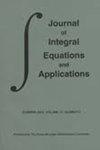弱奇异卷积积分的稳定收敛差分格式
IF 0.9
4区 数学
Q2 MATHEMATICS
引用次数: 0
摘要
利用泰勒级数和分数阶泰勒级数的展开和分组项,我们得到了卷积型弱奇异积分的新的数值格式,称为Caputo分数阶积分。分数阶泰勒级数展开自变量用于为具有最小正则性的函数提供分数阶近似。所得到的方案允许对C[0],T]中的函数进行近似,其中0<γ≤5。为隐式格式提供了一个温和的可逆性准则。分别证明了整数阶近似和分数阶近似的一致性和稳定性。对于u∈C[0,T],时间变量的收敛速度为O(τ),0<γ≤5,其中τ是时间网格的分区大小。至关重要的是,积分核K递减的假设不需要该方案在二阶及以下近似中收敛。然后证明了两组近似的最优收敛结果,其中分数阶近似在某些情况下可以获得高达整数的收敛率。最后,给出了数值例子来说明我们的发现。2000年数学学科分类。26A33、45D05、65R20。本文章由计算机程序翻译,如有差异,请以英文原文为准。
Stable and convergent difference schemes for weakly singular convolution integrals
We obtain new numerical schemes for weakly singular integrals of convolution type called Caputo fractional order integrals using Taylor and fractional Taylor series expansions and grouping terms in a novel manner. A fractional Taylor series expansion argument is utilized to provide fractional-order approximations for functions with minimal regularity. The resulting schemes allow for the approximation of functions in C [0, T ], where 0 < γ ≤ 5. A mild invertibility criterion is provided for the implicit schemes. Consistency and stability are proven separately for the whole-number-order approximations and the fractional-order approximations. The rate of convergence in the time variable is shown to be O(τ), 0 < γ ≤ 5 for u ∈ C [0, T ], where τ is the size of the partition of the time mesh. Crucially, the assumption of the integral kernel K being decreasing is not required for the scheme to converge in second-order and below approximations. Optimal convergence results are then proven for both sets of approximations, where fractional-order approximations can obtain up to whole-number rate of convergence in certain scenarios. Finally, numerical examples are provided that illustrate our findings. 2000 Mathematics Subject Classification. 26A33, 45D05, 65R20.
求助全文
通过发布文献求助,成功后即可免费获取论文全文。
去求助
来源期刊

Journal of Integral Equations and Applications
MATHEMATICS, APPLIED-MATHEMATICS
CiteScore
1.30
自引率
0.00%
发文量
16
审稿时长
>12 weeks
期刊介绍:
Journal of Integral Equations and Applications is an international journal devoted to research in the general area of integral equations and their applications.
The Journal of Integral Equations and Applications, founded in 1988, endeavors to publish significant research papers and substantial expository/survey papers in theory, numerical analysis, and applications of various areas of integral equations, and to influence and shape developments in this field.
The Editors aim at maintaining a balanced coverage between theory and applications, between existence theory and constructive approximation, and between topological/operator-theoretic methods and classical methods in all types of integral equations. The journal is expected to be an excellent source of current information in this area for mathematicians, numerical analysts, engineers, physicists, biologists and other users of integral equations in the applied mathematical sciences.
 求助内容:
求助内容: 应助结果提醒方式:
应助结果提醒方式:


